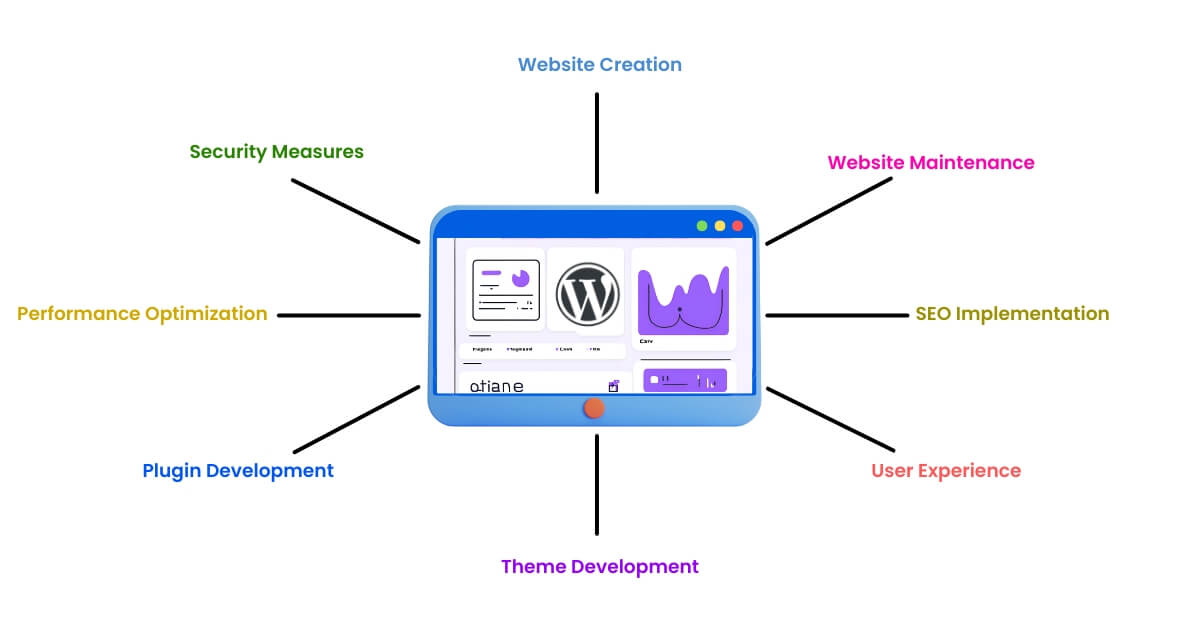The world of web development offers exciting opportunities, and WordPress sits at the forefront. WordPress is a powerful and versatile content management system (CMS) that powers over 43% of all websites globally, making it the most widely used CMS today.
Renowned for its user-friendly interface, extensive customization options, and vast library of themes and plugins, WordPress caters to a wide range of users, from bloggers and small businesses to large enterprises.
New to WordPress? Our beginner guide breaks down WordPress for you. Check it out here →
But how much can you expect to earn as a WordPress developer? In this article, we’ll delve into the WordPress developer salary, exploring various factors that influence earnings and providing insights into what you can expect. We’ll also equip you with tips to maximize your success!
- What Does a WordPress Developer Do?
- Are WordPress Developers in High Demand?
- WordPress Developer Salary Rates: Hourly, Monthly, and Yearly Breakdowns
- Geographic Variations in Salary:
- How to Maximize WordPress Developer Salary?
- Freelancing as a WordPress Developer
- Freelancing vs. Salaried Positions:
- Future Demand for WordPress Developers and Salary Trends
- Conclusion:
- Frequently Asked Questions
What Does a WordPress Developer Do?
Before diving into salary specifics, it’s essential to understand what a WordPress developer does. WordPress developers specialize in creating and maintaining websites using the WordPress content management system (CMS).

A WordPress developer can be involved in various tasks, depending on their skill level and the project’s requirements. Here are some of the key responsibilities:
Website Creation
The website creation process begins with collaboration. This is where the developer’s WordPress expertise comes into play. They’ll work closely with you, the client, to understand your vision and translate it into a functional and visually appealing website.
Website Maintenance (Entry-Level)
Regularly updating the website’s content, themes, and plugins to ensure they function correctly and securely. This job is suitable for entry-level developers with basic knowledge of WordPress and some coding skills.
SEO Implementation (Entry-Level to Mid-Level)
Applying search engine optimization (SEO) techniques to improve the website’s visibility in search engine results. This task can be handled by entry-level developers with basic SEO knowledge, while mid-level developers can implement more advanced SEO strategies.
User Experience (Mid-Level)
Enhancing the usability and accessibility of the website to ensure a positive experience for visitors. This job requires a good understanding of design principles and user behavior, making it suitable for mid-level developers.
Theme Development (Mid-Level to Senior-Level)
Creating custom themes that determine the website’s look and feel. This involves coding in languages like HTML, CSS, and JavaScript. Mid-level developers can start with basic theme customization, while more experienced developers can create fully custom themes.
Plugin Development (Mid-Level to Senior-Level)
Building custom plugins to add specific features and functionalities to WordPress websites. This requires a deeper understanding of WordPress architecture and coding in PHP, making it suitable for mid-level to senior-level developers.
Performance Optimization (Senior-Level)
Ensuring the website loads quickly and runs smoothly by optimizing code and implementing best practices for speed. This task requires advanced skills and experience, making it suitable for senior-level developers.
Security Measures (Senior-Level)
Protecting the website from potential threats by implementing security best practices and keeping software up-to-date. This critical task requires extensive experience and knowledge of web security, suitable for senior-level developers.
These varied responsibilities highlight the versatility and importance of WordPress developers in the web development landscape. Their expertise helps businesses create functional, visually appealing, and user-friendly websites.
Are WordPress Developers in High Demand?
The short answer to this is Yes, WordPress developers are in high demand.
With WordPress powering over 43% of the web, businesses and individuals are constantly seeking skilled developers to create, maintain, and optimize their websites. This translates to a thriving job market for WordPress developers.
If you’re passionate about building websites and possess the technical skills, a career in WordPress development offers a promising path with ample opportunities.
Moreover, the versatility of WordPress allows developers to work across various industries, including e-commerce, blogging, news, education, and corporate websites. This broad applicability further fuels the demand for WordPress developers.
Thus, the salary reflects this high demand, offering attractive compensation packages and career advancement opportunities for skilled professionals in this field. Businesses are increasingly seeking professionals who can create, and customize themes, develop plugins, and ensure website security and performance.
WordPress Developer Salary Rates: Hourly, Monthly, and Yearly Breakdowns
While many WordPress developer positions offer fixed annual salaries, some freelance or contract work might be offered with hourly rates. Here’s a breakdown of typical WordPress developer salaries in the US for 2025, presented in hourly, yearly, and monthly formats:
Note: These are general ranges and can vary significantly depending on the factors mentioned earlier (experience, location, skillset, etc.).
| Experience Level | Salary/Hour | Salary/Month | Salary/Year |
|---|---|---|---|
| Entry Level | $20 – $50 | $3,500 – $7000 | $40,000 – $70,000 |
| Mid Level | $50 – $100 | $6500 – $9000 | $70,000 – $110,000 |
| Senior Level | $100 – $150+ | $8,500 – $12,000+ | $100,000 – $130,000+ |
Additional Considerations:
- Freelance Rates: Freelance developers often charge hourly rates. These rates can be higher than salaried positions to account for the lack of benefits and potential income inconsistency.
- Location: Salaries tend to be higher in major cities with a higher cost of living.
- Benefits: Full-time positions typically offer benefits packages that can include health insurance, paid time off, and retirement contributions. The value of these benefits should be factored into your overall compensation picture.
Geographic Variations in Salary:
Location plays a significant role in determining salary. Here’s a brief overview of how earnings can vary by region:
United States:
WordPress developers in the U.S. generally earn between $60,000 and $110,000, depending on experience and location.
Europe:
Salaries in Europe vary widely. In Western Europe, developers can earn between €43,000 and €85,000, while in Eastern Europe, the range might be €20,000 to €50,000. Note that the cost of living can be significantly higher in Western Europe compared to Eastern Europe.
Asia:
In countries like India, Pakistan, and Bangladesh, salaries are lower. Typically, WordPress developers earn between ₹5,00,000 and ₹12,00,000 per year in India. While PKR 500,000 to PKR 2,500,000 annually in Pakistan, and BDT 400,000 to BDT 1,800,000 per year in Bangladesh.
How to Maximize WordPress Developer Salary?
Several factors influence a WordPress developer’s salary, and understanding these factors can empower you to maximize your earning potential. Let’s delve into the key players shaping your future WordPress developer paycheck!

1. Experience: The Cornerstone of Earning Power
Experience reigns supreme when it comes to salary. As you tackle more projects, hone your skills, and build a proven track record, your value proposition increases. Entry-level developers can expect a lower salary, while seasoned veterans with diverse skills command significantly higher rates.
2. Skillset: A Symphony of Expertise
A well-rounded skillset is your secret weapon. While a solid foundation in WordPress is essential. Proficiency in languages like PHP, HTML, and CSS, and familiarity with popular plugins and themes, significantly boost your earning potential.
Additionally, knowledge of security best practices, SEO optimization, and e-commerce functionalities can make you a highly sought-after developer.
3. Location, Location, Location (and Cost of Living)
Geography plays a role. Major cities with higher costs of living typically offer higher salaries compared to smaller towns. Research salary trends for WordPress developers in your specific location to get a clearer picture of what to expect.
4. Company Size: From Startups to Enterprises
The size of your employer also plays a part. Working for a large corporation often comes with a higher salary and benefits package compared to smaller agencies or freelance work.
However, smaller companies might offer more flexibility and a chance to wear many hats, which can be valuable for gaining experience.
5. Freelance vs. Full-Time: Charting Your Course
Freelance developers set their rates but face challenges finding consistent work. Full-time positions offer stability and benefits, but the salary structure is typically predetermined.
Consider your financial needs, lifestyle preferences, and risk tolerance when deciding between freelance and full-time work.
Bonus Tips For WordPress Developers:
- Research salary trends in your area for WordPress developers with your experience level.
- Start building a portfolio that showcases your expertise and accomplishments.
- Network with other WordPress developers to learn from their experiences and explore potential opportunities.
With dedication and these proven strategies, you can achieve your WordPress developer salary goals and build a thriving career!
Freelancing as a WordPress Developer
Freelancing as a WordPress developer offers an exciting path to achieve just that. Whether you crave the flexibility to work from anywhere in the world or desire to build a client base that aligns with your passions, freelancing opens doors to a world of possibilities.
Experienced freelancers usually charge between $30 and $100 per hour, depending on their skill level and the complexity of the projects. However, freelancing also comes with challenges, such as inconsistent work and the need for self-marketing.
Freelancing isn’t all sunshine and beaches. Inconsistent work can be a concern, especially when starting. Self-discipline and time management become crucial as you juggle client communication, project deadlines, and your business operations.
Marketing yourself and acquiring clients requires effort and ongoing strategy. But the good news is, that these challenges can be overcome. By honing your skills, building a strong portfolio, and developing effective client acquisition strategies, you can establish yourself as a valuable asset in the freelance market.
Freelancing vs. Salaried Positions:
WordPress developers have the flexibility to choose between freelancing and salaried positions. Both paths offer distinct advantages, allowing developers to select the career model that best suits their personal and professional goals.
We’ve created a table to help you decide between a freelance or salaried path, comparing the key features of each:
| Features | Freelancing | Salaried Position |
|---|---|---|
| Working Hours | Flexible, set your own hours | Structured, set hours by employer |
| Income | Variable, based on project rates and workload | Stable, fixed salary |
| Benefits | No employer-provided benefits (purchase individually) | Benefits like health insurance, retirement savings (may vary) |
| Project Selection | Choose your own projects | Assigned projects by employer |
| Working Place | Work from anywhere with an internet connection | Work in an office or designated workspace |
| Work Load | Manage yourself, find clients, market your skills | Managed by employer |
Future Demand for WordPress Developers and Salary Trends
The digital landscape is constantly evolving, but one thing remains clear: WordPress reigns supreme as the world’s most popular Content Management System (CMS).
As businesses of all sizes recognize the power and user-friendliness of WordPress, the demand for skilled developers continues to soar.
The future for WordPress development jobs is bright! WordPress developer salaries are set to rise as demand for skilled developers increases. Whether you are an aspiring developer or an experienced professional, staying updated with the latest trends and continuously improving your skills will position you well for the future.
The opportunities in this field are vast, making it an exciting and lucrative career choice.
Conclusion:
The world of WordPress development offers a dynamic blend of creativity, technical expertise, and a thriving job market.
We explored the essential tasks of WordPress developers, the high demand for their skills, and the competitive salary options (hourly, monthly, yearly) with freelance and salaried positions available. Geographic variations and maximizing your earning potential were also discussed.
The future of WordPress development is bright, fueled by constant innovation and a booming digital landscape. By continuously honing your skills and staying updated, you can position yourself for success in this exciting field.
Frequently Asked Questions
Ready to take the plunge? Explore online courses, join WordPress developer communities, and keep learning to solidify your place in this rewarding career path.
We hope this article sheds light on what WordPress developers do, their earning potential, and how to boost their salaries! Have more questions? Write in the comment box and let me help you. If you found it valuable, please share it with your friends because “Sharing is Caring.”




